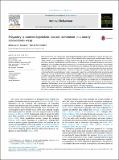Polyandry is context-dependent but not convenient in a mostly monandrous wasp
Abstract
Research over the past two decades suggests that polyandry is almost ubiquitous in nature. In some cases, females can gain direct and indirect (genetic) fitness benefits from mating with multiple males. However, when females accept superfluous matings without gaining any clear benefit, polyandry has been interpreted as a strategy to mitigate the costs of resisting or avoiding matings, a situation known as convenience polyandry. When females mate out of ‘convenience’ the mating rate is expected to be plastic, since females should mate at a higher rate when the costs of resistance or avoidance are high, for instance when males occur in high densities and/or around resources required by females such as oviposition sites. Here we show that remating in Nasonia vitripennis, a species of wasp that is largely monandrous in the wild but that evolves polyandry under laboratory culture, is dependent upon the availability of hosts for oviposition and upon male density. We found that females mated at a higher rate when male density was high but only if a suitable oviposition substrate was available. Outwardly this seems suggestive of convenience polyandry. However, females that remated under these conditions did not gain more time to oviposit than females that resisted superfluous matings. The results of this study highlight the importance of comprehensively assessing the costs and benefits of mating before attributing the observed behaviour to convenience polyandry. Furthermore, these results add to the growing body of evidence that the ecological context under which sexual interactions occur is critical to the economics of mating.
Citation
Boulton , R & Shuker , D M 2016 , ' Polyandry is context-dependent but not convenient in a mostly monandrous wasp ' , Animal Behaviour , vol. 112 , pp. 119-125 . https://doi.org/10.1016/j.anbehav.2015.12.001
Publication
Animal Behaviour
Status
Peer reviewed
ISSN
0003-3472Type
Journal article
Description
R.A.B. is supported by a NERC DTG studentship to R.A.B.Collections
Items in the St Andrews Research Repository are protected by copyright, with all rights reserved, unless otherwise indicated.

